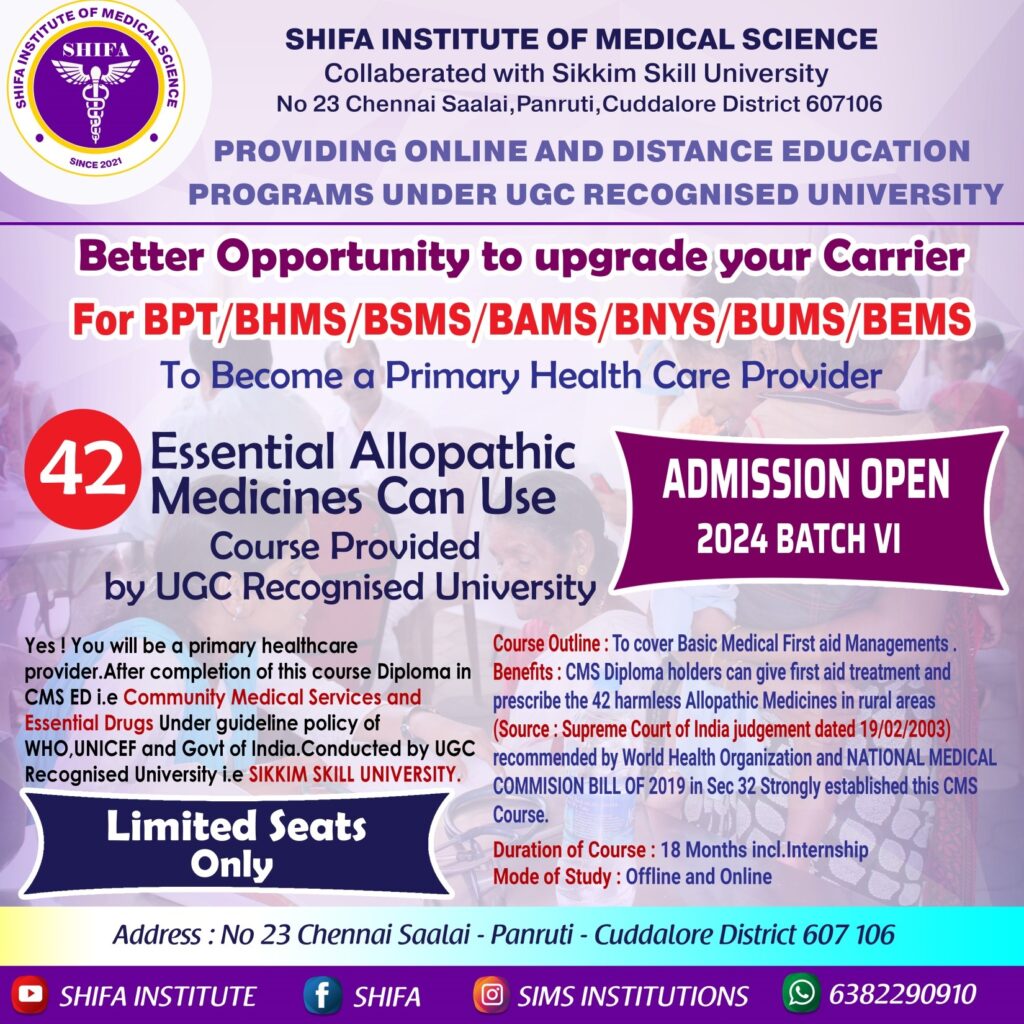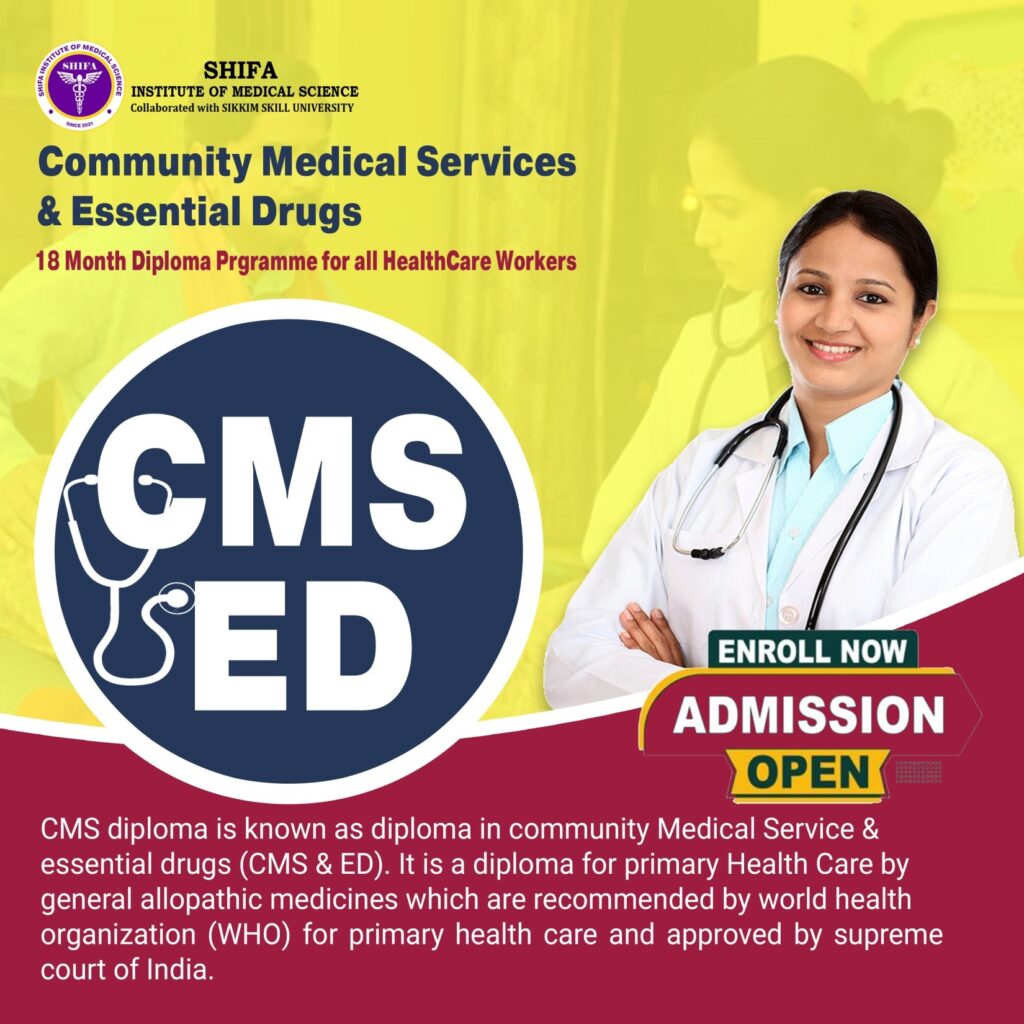CMS ED Course
CMS ED COURSE
SCOPE OF CMS & ED




Health for all by through the alma ata declaration signed by all members countries, the WH O was given call” Health for all 2000 A D.Course name community medical services and essential drug C M S (E D)course to traindoctor’s and Medical Proffesionals.
Practioners of all system and health workers and others supported by unique and W H O is (Geneva,Switzerland) guidelines.
After completing the C M S (E D) course the candidate will be eligible for admission to essential drug training .after which they will be authorized to use 42 essential drugsapproved by W H O.
- In India, there is a huge deficiency of qualified medical professionals.as per the WHO policy doctor patient ratio is 1:1000, while in India it is 1:10189. In addition, 80% of the Indian medical professionals serve in our urban population. It shows our semi -urban and rural areas needs more medical professional.
- All this data shows we have a huge requirement of medical professional especially in semi-urban and rural areas for primary medical care and first aid treatment.
- In our country approximately 40% of primary health centres run by without doctors. For example:- in rural U.P ,we have population of 15.5 crores and we have only 3621 PHCs. It’s too high ratio as per WHO and Indian Medical Standards. Recent economic survey report presented in the parliament also states the healthcare in rural areas remained a concern.
Eligibility & Duration
- The candidate must be a pass out from 10 or 10+2 in any stream from a recognized board of education.
- The duration of the course is 18 months or 1.5 years.The curriculum of the program includes 3 Semesters of 6 months each.
| Semester | Particulars | Fees |
| 1st Semester | Reg + Course + Book + ID | INR.10,000 |
| 2nd Semester | Course + Exam | INR.10,000 |
| 3rd Semester | Course + Exam | INR.10,000 |
| Total Fees | INR.50,000 |
- Documents should be submitted within 7 days of payment.
- Fee Paid oce will not be refundable in any case.
| Semester | Course Description | Competencies |
| 1st | The course intends to provide basic input to the students about the basics of human anatomy & physiology with pathology,community health & hygiene with the science of drugs and its administration. | · The students will acquire a brief knowledge about Community medical services & Essential drugs: · Knowledge of the normal structures & functions of the body · Knowledge of basic abnormalities/diseases of the human body · Knowledge of basics Drug making & actions with roles & responsibility of being a medical professional in rural areas. |
| 2nd | Students are provided with knowledge & skills on mental health, health education & communication, clinical emergencies, paediatrics, medicine & surgery, clinical emergencies, health planning &management, basic research methods, Community medicine & medical ethics. | · Student will acquire skills on Basic patient care. · Wound Dressing. · Immunization. · Identify health problems. · Administration of basic medication. · Giving health education to the rural communities. · Quality control in rural health care. · Application of ethical legal practices in their profession. |
| 3rd | Hands on application in different hospitals and first aid treatment centre with Video lectures on Drug picture of 100+ Essential Drugs. | · Student will be able to Practice, enhance & strengthen their skills. · Collect, analyse, interpret data & write a project report. · Direct patient handling · Medical waste Management · Basic NABH Training · Students are required to provide Certificate of Practice (COP), along with the project report · Detail study of Essential drugs. |
SYLLABUS FOR COMMUNITY MEDICAL SERVICE & ESSENTIAL DRUGS
(C.M.S. & E.D.) COURSE (IN ALLOPATHIC SYSTEM)
SEMESTER-1
SUBJECT CODE CMS01 – ANATOMY
- Introduction
- The Cell
- The Tissue
- Organs and System
- Skeletal System
- Joints of the SKELETON
- Blood
- Lymphatic System
- Cardiovascular System
- Respiratory System
- Urinary System
- The Muscular System
- The Physiology of Muscle
- Central Nervous System
- Autonomic Nervous System
- Organs of Special Senses
- Skin and Regulation of Body Temperature
- Digestive System
- Endocrine System
- Reproductive System
SUBJECT CODE CMS02 – PHYSIOLOGY
- Introduction
- The Cell
- The Tissue
- Organs and System
- Skeletal System
- Joints of the SKELETON
- Blood
- Lymphatic System
- Cardiovascular System
- Respiratory System
- Urinary System
- The Muscular System
- The Physiology of Muscle
- Central Nervous System
- Autonomic Nervous System
- Organs of Special Senses
- Skin and Regulation of Body Temperature
- Digestive System
- Endocrine System
- Reproductive System
SUBJECT CODE CMS03 – PATHOLOGY
- General Pathology
- Systemic Pathology
- Infection
- Clinical Pathology
- Introduction of Microbiology
SUBJECT CODE CMS04 – MEDICAL JURISPRUDENCE
- Criminal courts in India
- Indian legal system
- Procedure in court
- Medical ethics
- Injuries
- Rape indecent assaults, battery
- Medical examination and consent
SEMESTER – 2
SUBJECT CODE CMS05 OBSTETRICS AND GYNECOLOGY
- Obstetrics- (a) Antenatal care (b) Safe Delivery (c) Postnatal care
- Gynecology- Common Diseases
- Family Welfare- Family planning methods (Temporary & Permanent)
- Investigation of Sterility
- Reproductive & Child Health (RCH)
- National family Welfare pregnancy
- Complications of pregnancy
- Complications of Labor
- Common Gynecological Disorders
SUBJECT CODE CMS06 – PHARMACOLOGY
- General Pharmacology & Definition
- Pharmacy-source of drug,
- Form of drugs.
- Route of administration
- Various types of drugs –classification,
- Dose definition, minimum and maximum dose, calculating of dose
- Injection –definition, purpose of injection common dangers of injection,
- Different routes of Infusion.
- Infections
- Sterilization –disinfection
- thods of transmission diseases
- Immunization
- Definition of toxicology, General Principal of clinical toxicology
- Classification of poisons General treatment of poisoning
SUBJECT CODE CMS07 – PRACTICE OF MEDICINE
- Communicable diseases: Prevention, Control and Treatments
- Nutritional Deficiency diseases
- Hormonal diseases
- Home remedies
- Home nursing
- Drug addiction
- Mental diseases & Introduction of Psychology
SUBJECT CODE CMS08 – PRIMARY HEALTH CARE
- Sterility & Infertility
- Temporary & Permanent Contraception
- Common Viral & Bacterial Infection
- Primary Health Care
- First Aid & Referral.
SUBJECT CODE CMS09 – COMMUNITY HEALTH AND HYGIENE
- Concept of health disease and prevention
- Nutrition and balanced diet
- Communicable & Non Communicable disease
- Health Education & Personal hygiene
- Occupational Health & Hazard
- Human Sexuality
